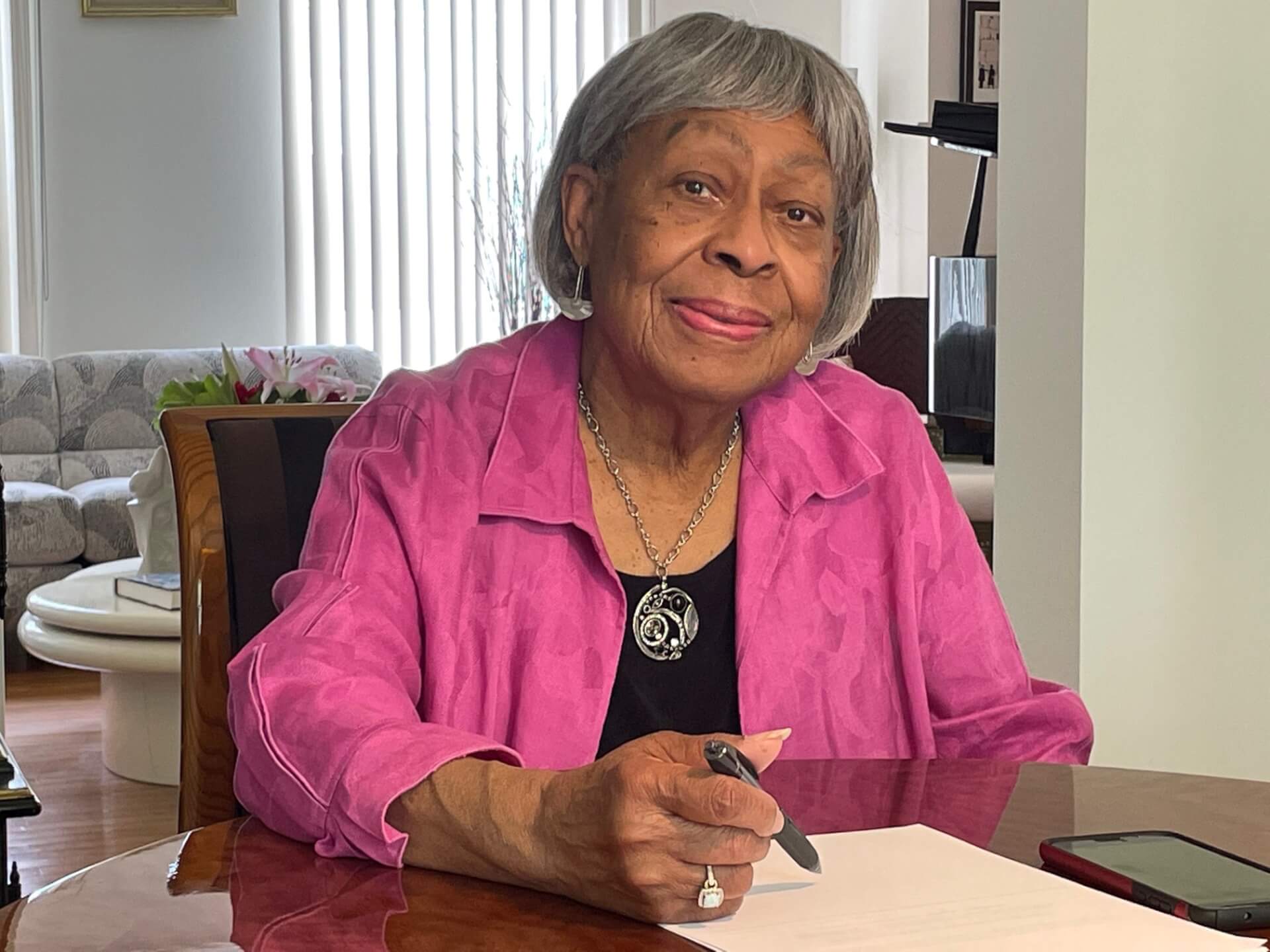Lawmaker Who Nudged Ferguson Toward the Gavel Reflects on His ‘Servant Heart’

In October 2019, when Thomas V. Mike Miller Jr. informed his state Senate colleagues that he would relinquish the gavel he had held for more than three decades, the discussions about who would replace him moved from respectful whispers to an all-out campaign.
If there was a frontrunner, it was probably Sen. Guy Guzzone (D-Howard), chairman of the Budget and Taxation Committee. But others were making a play for the Senate presidency as well, including Nancy J. King (D-Montgomery), Douglas J.J. Peters (D-Prince George’s) and Paul G. Pinsky (D-Prince George’s).
One influential but low-key member of the chamber — someone who wasn’t running — made an early decision to cast a wider net.
Finance Committee Chairwoman Delores G. Kelley (D-Baltimore County) felt it important to consider those who weren’t putting themselves forward. So she quietly began to review their accomplishments and activities — both in Annapolis and back home.
She soon found herself thinking that Bill Ferguson (D-Baltimore City), an unassuming 36-year-old who didn’t seem to be on anybody’s radar, might be the one.
“It occurred to me that sometimes the person who’s most ready to do something isn’t somebody who is out offering themselves,” Kelley said last week. (She called the early jockeying for position, while Miller was still serving — and in visible pain due to the spread of cancer — “unseemly.”)
“When I got to Bill Ferguson, it just kind of jumped out at me,” she recalled thinking. “We need somebody who is a fast learner and isn’t just out self-promoting if they’ve got nothing in particular to offer, except their sense of entitlement or their sense of wanting to move up.”
Not only was the youthful-looking Ferguson not in the State Circle chatter about who would succeed the legendary Miller, he didn’t begin to think of himself as a potential Senate president until Kelley raised — and pressed — the idea during a series of coffees.
From her perspective, Ferguson had the right mix of background, skills and temperament.
Born and raised in Montgomery County, he had both a law degree and a Masters in education, and he had worked in the Baltimore City schools through Teach for America. He was a policy wonk who had served on the Education, Health and Environmental Affairs and the Budget and Taxation committees.
In addition, Kelley believed he had a genuine empathy for people regardless of their station in life, he cared about the entire state, and didn’t appear to think he had all the answers.
“But, he wasn’t out promoting himself at all. To be honest, to this day, I don’t think he had thought about a move up like this.”
There was also the Baltimore connection. Kelley said Ferguson’s deep commitment to the city reminded her of a “buddy” with whom she served in the House of Delegates, former Speaker Ben Cardin (D), now a U.S. Senator.
“I thought [Baltimore] had not had the attention it needed for decades,” she said. “And I think it makes sense for any state — with its oldest and largest metropolis — to take care of it, to make sure it thrives, [to see that] it can be an economic engine again. It can be a place that people would find a healthy environment in which to raise families, and to grow old, and so on.”
Over the course of a 70-minute interview in her Randallstown home last week, Kelley reflected on the way Ferguson guided the Senate through his first two years on the job.
The 2020 session — Ferguson’s first as Senate president — was notable for the continued presence of Miller, a gigantic personality who wasn’t shy about sharing his views, and the arrival of the COVID-19 pandemic, which forced the General Assembly to adjourn early.
This year’s session was marked by an outsized number of thorny, emotional issues and the ongoing challenges triggered by the lingering pandemic.
Although there was nothing prideful about Kelley’s comments, it was clear that she feels good about her decision to coax her young colleague into running for the Senate’s top post. And her assessment of how Ferguson navigated the last two years offers potentially important clues about how he will lead the chamber in the future.
“For one thing, he will talk to everybody,” she said. “He’ll pick up the phone or — if he needs to come see you — he’ll do that. And he will talk to everybody to get people’s take on things, so that people don’t feel like he makes a lot of decisions all by himself in isolation and then tells you ‘this is what we’re going to do.’”
Ferguson consulted health and engineering experts about how to keep legislators from infecting one another — or staff — with COVID-19 while still allowing for the work to get done.
And once he had his plan, he insisted on sticking to it, even as colleagues (Kelley included) would occasionally chafe at being told to wait in the hallway until their biweekly test results came back clean.
He kept a close eye on the calendar and moved important bills and veto overrides quickly, Kelley said, mindful that the legislature might have to adjourn early again.
“He’s very systematic. He’s thoughtful. But then the other thing is, he’s outreaching to everybody. And I think that’s very important. Nobody felt that things were happening to them.”
“He sees himself more as one among many,” Kelley said. “He has said to me many times, everybody’s been elected by a constituency that’s nearly equal in size… and they all are important, and we can’t leave anybody out.”
“He’s got a kind of servant heart, is what I would call it.”
Some presiding officers give their committee chairs a lot of latitude; others do not. Kelley resisted describing Ferguson’s touch as being “light” or “heavy.”
“I would say it was a careful touch,” she said. “He would sometimes tell you, ‘Let’s slow down.’ …There were discussions sometimes. There was additional research done. You could come back to him. And there were decisions that he would make right up front because he thought we don’t know enough.”
The Senate and House were united in wanting to tackle police reform this past session, but the chambers had very different bills. That led to intense, sometimes emotional debates, and bruised egos — particularly between the House Judiciary and Senate Judicial Proceedings committees — about which path to pursue.
Kelley said Ferguson’s willingness to compromise at a key moment late in the scrum was borne of a desire to ensure that the entire session’s efforts didn’t blow up (as happened with significant climate and rental-assistance bills).
“I personally thought that the JPR group working on police reform had done a more systematic job,” she said, choosing her words carefully so as not to offend her District 10 colleague Adrienne A. Jones, the House Speaker.
“But [the House] wanted their way of doing it. And they wanted credit for what they felt they were doing, so they went after the one big bill. … And [Ferguson] had to really decide: Are we going to end up letting everything fall through, having nothing? And he said, ‘We can’t do that.’”
A former delegate who later served as vice-chair of JPR, Kelley is no stranger to the tensions that often flare between the two houses.
Multiple Senate sources say her one big ‘ask’ of Ferguson, once he was chosen to replace Miller, was that he replace Robert A. Zirkin as chairman of JPR.
Kelley offers a somewhat softer view, saying that Zirkin had already decided by then to leave the General Assembly in the middle of his term — and that Ferguson had determined largely on his own that new leadership was needed.
That said, she called her years on JPR “so frustrating,” because of the large number of bills she thought worthy that died without a vote. She called the committee’s new, more progressive approach “so refreshing.”
Even though leadership opportunities arise very infrequently in Annapolis, Kelley said there was no pushback from women legislators or the Senate Black Caucus, which she chairs, over her decision to advocate for a white man to take over for Miller — despite the 400-year-old legislature’s near-total absence of diversity in leadership.
In part, that’s because she doesn’t think Ferguson’s tenure will be anywhere as long as Miller’s.
“My sense is that he might want to do something else long before people would be tired of his being there.”
“I think he cares about the world. I think he looks at various paradigms and ways of serving, and he might want to do something else. He’s got the law degree. He could go be Attorney General when [incumbent Brian E.] Frosh steps down — and he would be great as something like that.”
“I think eventually he could be a good governor.”




 Creative Commons Attribution
Creative Commons Attribution